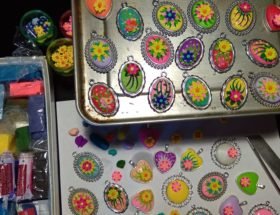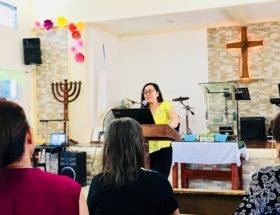MUCH-AFRAID STORY
My favorite allegory is that of a lady named Much-Afraid. She lived with her relatives in the Valley of Humiliation. Some of her cousins were Pride, Self-pity, Bitterness, Gloomy, and Graven Fear. Much-Afraid escaped from her relatives and went with the Chief Shepherd to the High Places. Her journey to the High Places speaks so much of what each and every one of us experience, especially as we dare follow Christ.
Early on in her journey, just when she thought she was going straight up to the mountains, her path meandered into the desert. As far as her eye could see there seemed to be nothing but the desert and endless expanse of sand dunes, without any vegetation. The only objects breaking the monotony of the desert were strange, towering pyramids, very old and grimly desolate. Much-Afraid was to go through the desert instead of going directly up the High Places.
Because she was as her name suggests, much afraid, she could not bear the thought of going through the horrible desert. The Shepherd explained that all of his servants on their way to the High Places have had to make that detour. It’s called ‘The furnace of Egypt.’ There they have learned many things which otherwise they would have known nothing about.
The Shepherd said, “Abraham was the first of my servants to come this way. Then came Joseph, with tears and anguish of heart. Since that time an endless succession of my people have come this way. They came to learn the secret of royalty. Those who come down to the furnace go on their way afterwards as royal men and women, princes and princesses of the Royal Line.”
All of a sudden, the desert was full of people, an endless procession of them. There was Abraham himself together with Sarah, his wife; there was Joseph, the betrayed and wounded brother who had been sold into slavery. Then one after another she saw a great host which no man could number, stretching across the desert in an endless line. The last one in the line held out a hand which Much-Afraid took, and there she was in the great chain herself.
As she joined the procession, she heard the Shepherd say, “Fear not, Much-Afraid, for I will there make of you a great nation; I will go down with you into Egypt; and I will also surely bring you up again” (Gen. 46:3).
Much-Afraid learned many things in Egypt, and I’ll tell you at least three.
1) In the threshing floor, she watched how different kinds of grain were grounded according to their use. She noticed how long the process took before the fine white powder was finished and ready for use.
The Shepherd says, as in Isaiah 28:29, “Remember, though bread corn is bruised, no one threshes it for ever; only until the bruised and broken grain is ready for its highest use does the thresher stop striking. This also comes forth from the Lord of Hosts, which is wonderful in counsel and excellent in working”
2) In Egypt, Much-Afraid learned how the potter molds the clay. The material was cut and kneaded and shaped as the potter saw fit, but the clay is always laid still upon the wheel, submitting to his every touch, perfectly, unresisting. “Cannot I do with you, Much-Afraid, as this potter? Behold, as the clay is in the hand of the potter, so are you in my hand” (Jer. 18:6).
3) In Egypt, she saw how the finest of gold was refined in a furnace of fire. “The rarest and choicest jewels and finest gold are those who have been refined in the furnace of Egypt,”
4) One thing, however, made a special impression upon her. Remember that there was almost no living thing in the desert. Yet on her last day there, she came upon a little golden- yellow flower, growing all alone. Much-Afraid asked, “What is your name, little flower, for I had never seen one like you before.” The tiny plant answered at once in a tone as golden as itself, “Behold me! My name is Acceptance-with-Joy.”
Much-Afraid thought of the things which she had seen in the pyramid: the threshing-floor and the whirring wheel and the fiery furnace. Somehow the response of the little golden flower which grew all alone in the waste of the desert stole into her heart and echoed there faintly but sweetly, filling her with comfort. She said to herself, “He has brought me here when I did not want to come for his own purpose. I, too, will look up onto his face and say, ‘Behold me! I am thy little hand-maiden Acceptance-with-Joy’”
– – – – – –
This sounds a bit gloomy but why did I start with the story of Much-Afraid? Because our theme today is Women of Faith and faith has to be properly defined. Some people think of faith as an almost magical force, that if you muster up enough of it, you’ll get rich, stay healthy, and get all you want in life. However, the picture of faith emerging from the pages of Scriptures is coupled with words like “persevere, endure, don’t lose hope.”
Faith is different from optimism or simply thinking positively. If we want to be optimistic, sometimes watching a Facebook motivational video or listening to Ted Talks might be enough. But faith is more than optimism because it is not based on any circumstance. Faith is fixing our eyes on a Person who is the firm foundation for all that we believe. Hebrews 12:2 says, “Fix your eyes on Jesus, the author and perfecter of our faith.”
The author of Hebrews, who enumerated a hall of fame of faithful men and women, concludes that faith most resembles a difficult race. The runner has her eyes on the prize and refuses to let up until she crosses the finish line. “Throw off everything that hinders,” he says, “strengthen your feeble arms and weak knees.” (Hebrews 12:1,12)
Now there are many examples of women of faith that we can possibly talk about. It was actually hard for me to choose, but I really wanted to hear from God as to how His heart beats for this group realizing the context and culture we are in. Today I hope that we learn from two women, both wives of a great king, similar in background, yet in contrast in their responses to life.
MICHAL
My co-worker said, no one has talked about Michal when it comes to faith. I have chosen Michal because her story deserves to be looked at more considerately. Today’s prevailing culture and worldview turns former antagonists into protagonists, for example, The Wicked, and other TV series. This present context demands a second look at Michal.
Michal was a daughter of King Saul, and first wife of King David. Being a princess then a queen, Michal had the most privileged relationship with two of the most noted men in the kingdom of Israel. She should have been the most protected girl, most respected and loved. But she was not.
Her father, King Saul, when he learned that Michal was in love with then young David, who was quickly becoming a threat to his throne, took advantage of her feelings. Saul used Michal in trying to outwit David.
First Samuel 18:20-21 says, “Now Saul’s daughter Michal was in love with David, and when they told Saul about it, he was pleased. ‘I will give her to him,’ he thought, ‘so that she may be a snare to him and so that the hand of the Philistines may be against him.’”
Michal saved David from her father Saul, as she had him escape. I can just imagine how she waited day and night for David to take her away. You know, a woman in love would bear difficult situations as long as she is with the love of her life. But David did not come for her.
Later, she was given to another man for marriage. Now this man, Paltiel, loved her so much. Michal stayed with Paltiel as a most loved wife for a long time. Most probably by that time, Michal was at peace at the realization that one person could love her truly.
Eventually, David was installed to the throne. To establish his political stand and to pacify former King Saul’s loyal supporters who were also his enemies, he had to take Michal back to him as a wife. Paltiel, was crying on the streets as she was being taken away! Poor Paltiel. Poor Michal! What do you think was she feeling while she was being forced to return to David, to leave the one man that loved her, and be manipulated for the sake of another?
Her response? She grew bitter.
Second Samuel 6:12-16 says, “Now David went to bring up the ark of God from the house of Obed-Edom to the City of David with rejoicing. Wearing a linen ephod, David was dancing before the Lord with all his might, while he and all Israel were bringing up the ark of the Lord with shouts and the sound of trumpets. As the ark of the Lord was entering the City of David, Michal, the daughter of Saul watched from a window. And when she saw King David leaping and dancing before the Lord, she despised (feel contempt, deep repugnance/abhorrence) him in her heart.”
Verses 20-23 continues, “When David returned home to bless his household, Michal daughter of Saul came out to meet him and said, ‘How the king of Israel has distinguished himself today, going around half-naked in full view of the slave girls of his servants as any vulgar fellow would!’ David said to Michal, ‘It was before the Lord, who chose me when He appointed me ruler over the Lord’s people Israel—I will celebrate before the Lord. I will become even more undignified than this, and I will be humiliated in my own eyes. But by these slave girls you spoke of, I will be held in honor.’ And Michal, the daughter of Saul, had no children to the day of her death.”
Michal grew bitter. The sweet lady in love who would have David’s back was changed into one who hated him deeply, could not appreciate his worship, and could not appreciate his God. The ending of her story found her unable, not just to bear children, but unable to give life. Her reaction to her situation was not life-giving – not life-giving to her husband, to her people, to her household, and more so to herself. What do you think of her story? Do you think that her tragedies justify her bitterness in life?
*A woman of faith is not defined by her circumstances
There is one more part of Much-Afraid’s journey that sticks to my mind. There’s the part where, after the many difficult paths she went through, she could now see the High Places in front of her. To her excitement, she ran, leaving her two guides, named Sorrow and Suffering, behind. She ran, only to see that the path again would meander and lead her away from the High Places. Much-Afraid stood completely still, dumb with dismay and shock. Then she began to tremble all over.
Up from behind her rose the form of her enemy Bitterness. He was following her hoping to convince her to turn back from her journey, all the time telling her that the Shepherd was only deceiving her. He did not come any nearer, because he feared that Much-Afraid would call the Shepherd. Bitterness simply stood and looked at her and laughed and laughed and laughed, the bitterest sound that Much-Afraid had heard in all her life. Then he said, as venomously as a viper, “Why don’t you laugh too, you little fool? You knew this would happen.”
This convincing to laugh bitterly reminds me of Eve in the garden. Eve did no laughing, but she was convinced; she was convinced that God was withholding something good from her. Eve was convinced that she should take matters in her own hands and fix/establish her grounds.
Just as Michal was convinced, that her tragedies justify her bitterness, and that because she was bitter, the best she could do was to try to dominate the world and do according to what she thought was right for herself.
That has been the story of women ever since. Whenever a woman falls out of grace, her tendency is either to dominate/control or to be clingy/dependent/addicted – to make things right for herself. But remember, whenever we have to define what is right, what is right is always life-giving.
Let us go back to Much-Afraid. Instead of laughing bitterly, she cried. She cried out to the Shepherd for help and clarification; hence she got the inner joy and peace that transcends her understanding. Crying is very important to a woman. It is not at all an expression of weakness but of strength, especially when we cry out to God for the right things. This is why I encourage you that aside from meeting more often, you have to schedule meetings wherein you can pause for deep reflections and pause to be soaked in the presence of God. The world is so loud and busy. And we should know by now that this life will not baby sit us. We will surely go through tough and dark times. We need to relearn silent meditations and retreats. Gatherings like this, and all the lunch fellowships are fun, but they cannot heal. Only silence and crying out to God can heal and bring light to the dark places of our souls.
Oh, I have to tell you how Much-Afraid’s story ended. She reached the high places. She was crippled at the beginning, but as she journeyed through difficult paths, she slowly gained feet like those of a hind’s feet. “Make my feet like the feet of a deer, able to climb high places.” Then, Much-Afraid finally understood the names of her two guides, Sorrow and Suffering, in the language of the High Places. Sorrow and Suffering, were actually Joy and Peace. As for her, Much-Afraid was changed to Glory and Grace.
A woman of faith is not defined by her circumstances.
ABIGAIL
Abigail too had to deal with a very difficult situation, being married to a fool. This fool had her life and the lives of her whole household in danger of death. We find her story in 1 Samuel 25:
There was a wealthy man from Maon. This man’s name was Nabal, and his wife, Abigail, was an intelligent and beautiful woman. But Nabal was crude and mean in all his dealings.
David’s men had treated Nabal’s shepherds kindly, protecting them from harm or at the very least, not stealing from them anything. David figured that this meant Nabal owed him something, and he sent a delegation to ask Nabal to donate some food for his army.
Nabal would have nothing of it. Not only did he refuse to give David anything for the feast, he insulted David publicly, denied knowing David, and impugned David’s integrity as a rebel against Saul. Nabal’s own servants described their master as “so ill-natured that no one can speak to him.” Consequently, David immediately set out with 400 armed men to slay Nabal and kill every male in his household.
David was about to commit mass murder while Nabal cares more about himself than about his workers and family. Thank God, Nabal’s wise-hearted wife Abigail stepped into the fray. She quickly prepared a feast for David and his men. She then rode out to meet David with an apology that set a new standard for courtesy in the Old Testament. David was moved by her words and abandoned his plan to kill Nabal and all his men and boys. He even thanked Abigail for diverting him from his reckless plan. “Blessed be your good sense, and blessed be you, who have kept me today from bloodguilt and from avenging myself by my own hand!”
Verses 37 to 39 of 1 Samuel says, “In the morning when Nabal was sober, his wife told him what had happened. As a result he had a stroke, and he lay paralyzed on his bed like a stone. About ten days later, the Lord struck him, and he died. When David heard that Nabal was dead, he said, ‘Praise the Lord, Nabal has received the punishment for his sin.’ Then David sent messengers to Abigail to ask her to become his wife. And so she became his wife.”
*A woman of faith maintains a clear vision of God’s great plan
Abigail is dearly remembered because of her wisdom. What was she wise about? Was it because she was diplomatic, able to manage a critical situation?
She was deemed wise because her actions and words were life-giving. They were life-giving because they were anchored on a firm belief in God’s plans for David. God had chosen David to be His servant-king, a mighty leader in Israel, who would not only lead his people justly, but also to establish a kingdom that will stand as a testimony for God. Abigail firmly believed in David as she firmly believed in God and His plans.
This was what she told David at the time that he was disillusioned, short-sighted, and insensible:
“Now, my lord, as surely as the Lord lives and you yourself live, since the Lord has kept you from murdering and taking vengeance into your own hands, let all your enemies and those who try to harm you be as cursed as Nabal is. Please forgive. The Lord will surely reward you with a lasting dynasty, for you are fighting the Lord’s battles. And you have not done wrong throughout your entire life. Even when you are chased by those who seek to kill you, your life is safe in the care of the Lord your God, secure in his treasure pouch! But the lives of your enemies will disappear like stones shot from a sling! When the Lord has done all he promised and has made you leader of Israel, don’t let this be a blemish on your record. Then your conscience won’t have to bear the staggering burden of needless bloodshed and vengeance. And when the Lord has done these great things for you, please remember me, your servant!” (1 Samuel 25:27-31)
David, even though he was by himself a strong army, walked a very difficult path. He had had his better times when he confidently declared, “With my God, I can leap over a wall; though I walk in the Valley of Death, I will fear no evil!” But that’s the thing, he went through Valleys of Death. And when he was weak, disillusioned, furious and insensible, God sent him Abigail. With Abigail’s words, David remembered that he was a royalty, with a very high calling. His shortsightedness and fury changed into hopefulness and confidence. His hands were spared from unnecessary bloodshed.
“David replied to Abigail, ‘Praise the Lord, the God of Israel, who has sent you to meet me today! Thank God for your good sense! Bless you for keeping me from murder and from carrying out vengeance with my own hands.’ Then David accepted her present and told her, ‘Return home in peace. I have heard what you said. We will not kill your husband.'” (1 Samuel 25:32-35)
We have a high calling as women. On our shoulders are a lot of roles, and those roles are very crucial indeed. Let a woman in the house play her role mischievously, and the home crumbles. The same is true in a workplace and everywhere. The best way we can play those roles is not to take control or dominate, not to play clingy and dependent. The best way is to BELIEVE! Firmly believe, with our doubts nailed at the foot of the Cross. Believe that our husbands can rise up to be tender warriors, rise up as leaders in the home, believe that our kids can be the best they can be, believe this present culture of dismay can turn around, believe and not lose sight of God’s good plans.
If we can not believe in people, we can at least believe in a God who says,
“I am Yahweh, I am the Lord who created you, I formed you. Do not fear, for I have redeemed you; I have called you by name; you are mine. When you pass through the waters, I will be with you; and when you pass through the rivers, they will not sweep over you. When you walk through the fire, you will not be burned; the flames will not set you ablaze. For I am the Lord your God, your Holy One, your Savior. You are precious to me, you are honored in my sight, and I love you.” (Isaiah 43: 1-4)
A woman of faith maintains a clear vision of God’s great plan.
*A woman of faith takes steps in recovering a culture of godliness
My husband was teasing me saying that this message took me the longest to prepare. One reason is that, honestly, this is one tough lesson for me to apply myself. I too am dealing with so many things that sometimes disillusion me.
Another reason is that, I begged God to give us a Word that will not simply sound good, but rather a Word that will make us search our hearts and stir us with dissatisfaction. We should realize that we should not be satisfied with where we are in our pursuit of God, that there is something radically missing, and that we should be moved to take radical adjustments in our lives.
There is so much lostness in our world today! In the US alone, depression is the leading cause of disability and suicide is the second cause of death among ages 15 to 44. A friend says that even younger kids are taking their own lives now.
This world needs us to rise up as women of faith, mighty and courageous, who are willing to turn the story of our household, our marriages, our children, our culture, and also our selves from darkness to light, from death to life, from a culture of defeat into a culture of godliness and faith.
We need to give this world the much needed rest from all its restlessness.
A woman of faith takes steps in recovering a culture of godliness.
And it takes a lot of transforming in the mind (Romans 12 says be transformed by the renewing of your mind). It takes a lot of redefinition. We have to define things in regards to the truth. Jesus says, “I am the truth!” We will have to define “right from wrong” not as one that can make us happy, for that is a shallow definition. Define “right” as one that gives life. And define life as what it really is – not temporal and shallow like partying, and addictions, but life as abundant and whole and lasting. Everlasting. Jesus says, “I am the life.”
We have to rise up and help one another.
Abigail was a perfect example of being a helpmeet in a wife. Whenever David needed advice, he would consult Abigail. Yet, we really hate this term, “helpmeet/helper” as a description for women, don’t we? It is a very poor translation I agree. It is because the original word in Hebrew is one of the most difficult to translate for its grand, broad and deeply beautiful complexity.
The original word is EZER in Hebrew and Parakletos in Greek. It is the same name for the Holy Spirit in John 14:26 “But the Helper, the Holy Spirit, whom the Father will send in My name, He will teach you all things, and bring to your remembrance all things that I said to you.” Don’t we like that verse? That Helper name for the Holy Spirit? We like it so much, because it is the very thing that we need most. It is also the same word in Psalm 121, which we quote whenever we are fearful and in need, “I lift my eyes up to the hills, where does my EZRI, my help, come from? My Ezri, my help comes from the Lord, the maker of heaven and earth.”
God knew that this entire world cannot be left alone, so He made us, women. He made us EZERs. One close translation which I like much better is “sustainer of life beside him.” We are supposed to sustain life, not just in procreation, but life in its deepest essences – to keep the home alight, to cast vision, to spread beauty, to keep joyful and serene, to make whole whatever is lacking, to sustain life.
We are in a very crucial time in history – we are in a time where there is so much confusion and distraction and distress, and brokenness. There is a confounding sense of lost-ness.
Just like Abigail, we are called to bring light to the dark places of peoples’ lives, to give wisdom and direction, to remind our husbands and children of their royalty and purposes, to be a sustainer of life alongside. We are called to be WOMEN OF FAITH and thereby bring others into faith as well.
But how do we do this? How do we do this when oftentimes, the person that we have to bring to faith is no other than ourselves? We are the most restless person we know; we are the most bitter and unforgiving, we are the most insecure and undirected. We are the most needy and controlling. We are the most dramatic. How do we find the rest that our souls need so much, the restfulness that is life-giving?
THE ANCIENT PATH
In Jeremiah 6:16 is a profound verse that says, “Stand at the crossroads and look; ask for the ancient paths, ask where the good way is, and walk in it, and you will find rest for your souls.”
1) STAND AND LOOK. This life offers so many crossroads. Don’t rush into them. It is important to stop and examine the way. Which is a better way? Beware of busyness without stillness. It is good to have a “to-do” list, but the first thing that we are encouraged to do is to have a “stop-doing” list. Think through the things we have to stop doing in order that the purposes, plans and principles of God become operative in our lives. What are the things we should stop doing, so that we can start doing the things God wants us to do?
2) ASK. We lose our sense of direction because we assume that we already know, and because we assume that we know, we fail to ask. This oftentimes happens with how we deal with God. We fail to stop and ask God because we assume that we already know. Beware of knowledge without wisdom.
We ask for Ancient paths – OLAM: vast, immense space and distance, immeasurable; timeless, eternal. The essence of eternity is its timelessness. Ask and return to the timeless path.
Psalm 90 says, “Before the mountains were born or you brought forth the earth and the world, from everlasting to everlasting you are God.”
In Exodus 3, God said to Moses, “I am who I am.” – He exists, He is unique (no one is like Him), and He is immanent/unchanging/everlasting.
Revelations 1:8 says, “’I am the Alpha and the Omega,’ says the Lord God, ‘who is, and who was, and who is to come.’”
And finally in John 8:58, Jesus said, “I tell you the truth, before Abraham was born, I am!”
3) WALK IN IT. Beware of thought without action. Shema Ysrael, Shema! Listen and obey.
At the crossroads of your lives, may you find the road toward the Cross, and find your rest there.
GOSPEL
The Bible says in John 14:6, Jesus speaking, “I am the way, the truth, and the life; No one comes to the Father except through me.” And in 1 John 5:13, “I write this to you who believe in (adhere to, trust in, and rely on) the name of the Son of God, so that you may know [with settled and absolute knowledge] that you have life, yes, eternal life.” When you evaluate your self, do you have this personal assurance that you have this faith in Jesus Christ that can give you life?
* (I delivered this message at Delta Baptist Church Women’s Tea Party on May 26, 2018 at Pittsburg, California with the theme Women of Faith.)








